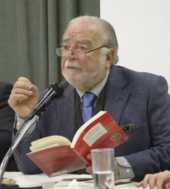Manuel Alegre
Manuel Alegre (born May 12, 1936 in Águeda ) is a Portuguese poet and socialist politician . He was an independent candidate for the 2006 presidential election . Alegre ran again in the 2011 presidential election.
Life
While studying law at the University of Coimbra , he became an opponent of the dictatorial government of António de Oliveira Salazar . He was drafted into the military and sent to the Azores and later to Angola . There, his involvement in an attempt at military rebellion led to his arrest. After serving in Luanda prison , he returned to Coimbra before going into exile in 1964. As a student he played an active role in the Associação Académica de Coimbra , as a member of the board, as an athlete and in theater and poetry.
He spent the next 10 years in Algiers , where he was one of the main voices of the Voz de Liberdade / Voice of Freedom radio programs broadcast to Portugal . The delivery of his first books was prohibited by the Salazar regime, so they were circulated in the samizdat . Alegre returned to Portugal in 1974, a week after the Carnation Revolution began .
Immediately thereafter, he joined the Socialist Party and has been elected to parliament in every election since 1975. He is currently one of the Parliament's Vice-Presidents and has a seat on the Council of State advising the President .
Various of his poems have been set to music, sung by José Afonso and Adriano Correia de Oliveira and played by Carlos Paredes .
One of his poems, Uma flor de verde pinho , won the 1976 RTP de Canção Festival and represented Portugal in the Eurovision Song Contest .
In 2004 he lost the election for party chairmanship to José Sócrates .
In 2005 a statue was erected in Coimbra in his honor.
On September 24, 2005, he announced that he would run for former President Mário Soares in the 2006 presidential elections, despite his party's official support . In the elections on September 22, 2006, he received 20.6% of the votes cast, the second highest percentage of votes after the elected Aníbal Cavaco Silva and before Mário Soares.
Works
- Poetry
- Praça da Canção (1965)
- O Canto e as Armas (1967)
- Um barco para Ítaca (1971)
- Letras (1974)
- Coisa Amar, Coisas do Mar (1976)
- Novo do Achamento (1979)
- Atlântico (1981)
- Babilónia (1983)
- Chegar Aqui (1984)
- Aicha Conticha (1984)
- Obra Poética , Vol. I, O Canto e as Armas (1989)
- Obra Poética , Vol. II, Atlântica (1989)
- Rua de Baixo (1990)
- A Rosa eo Compasso (1991)
- Com que Pena (1992)
- Sonetos do Obscuro Quê (1993)
- Coimbra Nunca Vista (1995)
- Trinta Anos do Poesia (1993)
- As Naus de Verde Pinho (1996)
- Alentejo e Ninguém (1996)
- Che (1997)
- Senhora das Tempestades (1998)
- Pico (1998)
- Rouxinol do Mundo (1998)
- Obra Poética (1999)
- Livro do português Errante (2001)
- Diálogos = Cristina Valada + Manuel Alegre (2001)
- prose
- Jornada de África (1989)
- O Homem do País Azul (1989)
- Alma (1995)
- Contra a Corrente (1997)
- A Terceira Rosa (1998)
- Uma Carga de Cavalaria (1999)
- Arte de Marear (2002)
- Cão como Nós (2002)
- To Velho em Arzila (2003)
- Rafael (2004)
- O Quadrado (2005)
- Published in German translation
- Manuel Alegre: poems and prose as well as an interview with the author. Transferred by Sarita Brandt. TFM, Frankfurt am Main 1998, ISBN 3-925203-57-5 .
- Rafael. Novel. Translated from the Portuguese by Markus Sahr. Edition Erata, Leipzig 2007, ISBN 978-3-86660-029-4 .
- Cão como nós. A dog like us. Translated from the Portuguese by Markus Sahr. TFM, Frankfurt am Main 2011, ISBN 978-3-939455-05-9 (bilingual).
Awards
In 2017 Alegre was the winner of the Prémio Camões , a literary prize that is regarded as important in the Portuguese-speaking world . Alegre is the president of the jury for the second highly prestigious Portuguese literary prize, the Prémio LeYa .
Web links
- Manuel Alegre's website (Portuguese)
- Literature by and about Manuel Alegre in the catalog of the German National Library
Individual evidence
- ↑ Luís Miguel Queirós: Manuel Alegre é o vencedor do Prémio Camões. June 8, 2017. Retrieved June 9, 2017 (Portuguese).
| personal data | |
|---|---|
| SURNAME | Alegre, Manuel |
| BRIEF DESCRIPTION | Portuguese poet and politician, member of the Partido Socialista |
| DATE OF BIRTH | May 12, 1936 |
| PLACE OF BIRTH | Águeda |
